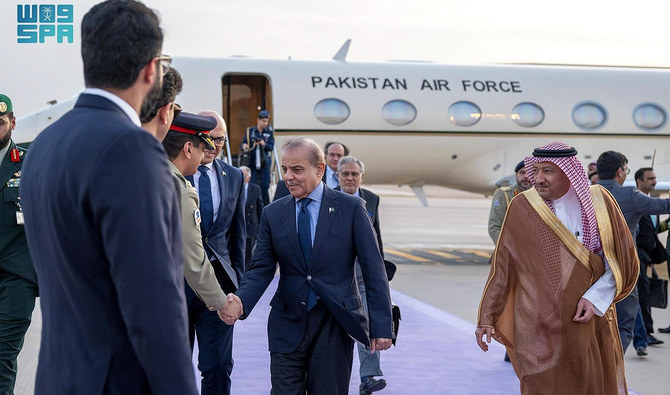ISLAMABAD: Prime Minister Shehbaz Sharif arrived in Riyadh on Saturday to attend a two-day special conference of the World Economic Forum (WEF).
The WEF meeting on global collaboration, growth and energy will be held in the Saudi capital on April 28-29, according to PM Sharif’s office.
The prime minister was extended an invitation to attend the meeting by Crown Prince Mohammed bin Salman and Professor Klaus Schwab, the WEF executive chairman.
“Prime Minister Muhammad Shehbaz Sharif has arrived in the Saudi capital Riyadh,” said an official statement circulated in Islamabad.
“At Riyadh’s Royal Airport, the Deputy Governor of the Riyadh Region, His Highness Prince Muhammad bin Abdul Rahman bin Abdul Aziz, the Ambassador of Pakistan in Saudi Arabia, and other diplomatic staff welcomed the Prime Minister,” it added.
Prior to his departure, the PM Office said Sharif would be accompanied by a high-level delegation including foreign minister Ishaq Dar and finance minister Muhammad Aurangzeb.
“The Prime Minister and the Ministers will participate in WEF discussions on issues related to trade and investment measures, new investment frameworks, restructuring of supply chains, sustainable growth, and the energy landscape,” it added.
Sharif’s participation in the forum will afford Pakistan an opportunity to highlight its priorities in global health architecture, inclusive growth, revitalizing regional collaboration, and the need for striking a balance between promoting growth and energy consumption.
“On the margins of the main event, the Prime Minister and his delegation will hold bilateral meetings with world leaders, including the Saudi leadership, heads of international organizations, and other prominent figures participating in the event,” the statement added.
The prime minister will also attend the 15th session of the Islamic Summit Conference organized by the Organization of Islamic Cooperation (OIC) on May 4-5 in the Gambian capital of Banjul to discuss a variety of regional and global issues, including Palestine, Islamophobia, climate change and the status of minorities, the Pakistani state-run APP news agency reported.
The session will be held under the slogan “Enhancing Unity and Solidarity through Dialogue for Sustainable Development,” according to a press release issued by the OIC General Secretariat.
The Islamic Summit is a principal organ of the OIC focused on the formulation, development, and implementation of decisions made by 57 member states. It is attended by concerned heads of state such as prime ministers, presidents, emirs and other equivalent heads.
Pakistan PM arrives in Riyadh to attend World Economic Forum meeting
https://arab.news/gmeng
Pakistan PM arrives in Riyadh to attend World Economic Forum meeting

- PM Sharif is expected to discuss inclusive growth, regional collaboration and energy issues at the gathering
- He will also attend the Islamic Summit Conference in Gambia on May 4 to discuss Islamophobia and Palestine
Pakistan to promote mineral sector at Saudi forum this month with 13 companies

- Delegation will take part in the Future Minerals Forum in Riyadh from Jan. 13-15
- Petroleum minister will lead Pakistan, participate in a 90-minute country session
ISLAMABAD: Around 13 Pakistani state-owned and private companies will attend the Future Minerals Forum (FMF) in Saudi Arabia from Jan. 13 to 15, an official statement said on Friday, as the country seeks to ramp up global engagement to develop its mineral resources.
The FMF is an international conference and investment platform for the mining sector, hosted by mineral-rich countries to attract global investors, companies and governments.
Petroleum Minister Ali Pervaiz Malik confirmed Pakistan’s participation in a meeting with the Saudi envoy, Nawaf bin Said Al-Malki.
Pakistan hosts one of the world’s largest copper-gold zones. The Reko Diq mine in southwestern Balochistan, with an estimated 5.9 billion tons of ore, is partly owned by Barrick Gold, which calls it one of the world’s largest underdeveloped copper-gold deposits. Its development is expected to boost Pakistan’s struggling economy.
“Upon an invitation of the Government of the Kingdom of Saudi Arabia, the Federal Minister informed the Ambassador that Pakistan will fully participate in the upcoming Future Minerals Forum (FMF), scheduled to be held in Riyadh later this month,” Pakistan’s Press Information Department (PID) said in an official statement.
The Pakistani minister will lead his country’s delegation at the FMF and take part in a 90-minute country showcase session titled “Unleashing Potential: Accelerating Pakistan’s Mineral Revolution” along with local and foreign investors.
Pakistan will also establish a dedicated pavilion to highlight the vast potential of its rich geological landscape to the global mineral community.
The Saudi envoy welcomed Pakistan’s decision to participate in the forum and discussed enhancing bilateral cooperation in the minerals and energy sectors during the meeting.
According to the statement, he highlighted the potential for cooperation between Saudi Arabia and Pakistan in the minerals and energy sectors, expressing confidence that the FMF would provide a platform to expand collaboration.
Pakistan’s mineral sector, despite its rich reserves of salt, copper, gold and coal, contributes only 3.2 percent to the country’s GDP and just 0.1 percent to global mineral exports.
However, many countries, including the United States, have shown interest in Pakistan’s underdeveloped mineral sector, particularly in copper, gold and other critical resources.
In October, Pakistan dispatched its first-ever shipment of rare earth and critical minerals to the United States, according to a Chicago-based US public relations firm’s report.










